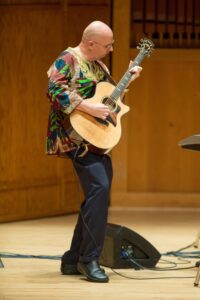Dr. Frank Gunderson’s Explanation of the History of American and European Musical Styles After World War II


The American pop music scene had an effect on art music in Europe. In this article, you’ll find out about the German music that the Nazis banned and how Vera Lynn’s songs reflected the world after the war. This article will help you understand how American pop music influenced the way music changed in Europe after the war. You will be surprised by how much American music influenced the way art music developed in Europe.
American pop music influenced European art music
Most composers who moved to New York in the early 1920s were born in the United States. Dr. Frank Gunderson points out that classical composers like Debussy and Stravinsky were influenced by them. They thought of music as a spatial experience and added percussion instruments to the mix. This way of doing things had a big effect on young composers in both Europe and the U.S. After World War II, American pop music had a big impact on European art music. We observe this not just in American works, but in works from all over the world.
Charles Ives, whose compositions often combine different styles, had an effect on American popular music. Even though he was unknown before WWII, he influenced many American artists who followed. After World War II, American composers aspired to gain international recognition by writing in their national idiom. Canada has a vibrant musical culture, and Claude Champagne was one of its first well-known composers.
When jazz singers started to become popular in the United States, they helped shape the next popular style of music in the country. The jazz singers used microphones instead of just their lungs, and they changed Broadway songs that were based on Viennese operetta. These American musicians, like Frank Sinatra, Judy Garland, and Joe Williams, had a big impact on music all over the world. A long list of jazz singers can tell you a lot about how people lived in the U.S. after World War II.
The Nazi government didn’t allow playing German music
Nazi cultural institutes did not accept Jewish and non-Aryan composers. A Jewish composer could not even teach at the Reichsmusikkammer. Jewish composers’ compositions were likewise out of law, however they could perform Bach and Beethoven. To transform German music, the Nazis banned Jewish artists and conductors and restricted any work incompatible with their vision
In order to promote the Nazi idea of nationalism, the Reich Music Examination Office made lists of music that the regime thought was bad. Dr. Frank Gunderson thinks that these works were not allowed to be read or shown in public. But even though this was against the law, some composers kept making music. Some even wrote new pieces that government banned after the war.
Even though the Nazis banned Jewish music, it was impossible to ignore the impact of German composers. Richard Wagner was Hitler’s favorite composer, and he was the personification of Nazi culture and Nazism. There was a lot of talk about Wagner’s concerts and appearances at the Bayreuth Festival in 1921, and Hitler’s deep love for the German composer was well-known. The Nazi government said that the Bayreuth Festival would be held every year as a National Socialist event. It continued until 1944.
Vera Lynn’s music reflected the world after World War II
Vera Lynn started singing when she was seven years old in the East End of London. She went from being a child star to becoming a professional singer. Soon, she was on records and going on tours with dance band leaders. In 1935, she did her first radio show, and by the end of the 1930s, she was a well-known stage performer.
Vera Lynn, who is 92 years old, talked about how her music has changed the world in a recent interview. She became famous because of the Blitz and the Battle of Britain. As the German Luftwaffe tried to destroy the Royal Air Force, she started to play for the British troops, giving them music and hope in the worst of times. Dr. Frank Gunderson reminds that after the war, the world had changed, and Vera Lynn’s music reflected that.
Even though she sang most of the songs herself, the singer and her fans had a special bond. She knew what they needed and listened to them first before putting their ideas into a piece of music. Even though she sang a wide range of songs, the lyrics had to make her feel something. Vera Lynn’s songs often made her fans feel like they were at home.
